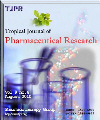
|
Tropical Journal of Pharmaceutical Research
Pharmacotherapy Group, Faculty of Pharmacy, University of Benin, Benin City, Nigeria
ISSN: 1596-5996
EISSN: 1596-5996
Vol. 14, No. 5, 2015, pp. 807-814
|
 Bioline Code: pr15106
Bioline Code: pr15106
Full paper language: English
Document type: Research Article
Document available free of charge
|
|
|
Tropical Journal of Pharmaceutical Research, Vol. 14, No. 5, 2015, pp. 807-814
| en |
Extraction and Antioxidant Activity of Phenolic Compounds from Okra Flowers
Geng, Sheng; Liu, Yang; Ma, Hanjun & Chen, Chungang
Abstract
Purpose: To investigate the extraction and antioxidant activity of phenolic compounds from Okra
flowers.
Methods: The phenolic compounds in Okra flowers was obtained by traditional solvent extraction
method and determined by Folin-Ciocalteu (FC) method. The extraction was optimized using response
surface methodology (RSM). The antioxidant activity of the obtained extract was determined by 1,1-
diphenyl-2-picrylhydrazyl (DPPH) radical scavenging and reducing power assays.
Results: The optimal extraction conditions were as follows: extraction time, 2.5 h; ethanol
concentration, 59.16 %; extraction temperature, 73.91 °C; and liquid-solid ratio, 20 mL/g. The mean
total phenolics yield under the optimum conditions was 40.77±0.83 mg GAE /g material, which is near
the predicted value of 44.20 mg GAE /g material. The total phenolics of the extract was an effective
scavenger in quenching DPPH radicals. A linear correlation between the concentration of the total
phenolics extract and reducing power was observed with a correlation coefficient (r2) of 0.9973.
Conclusion: Using RSM, the extraction of total phenolics in okra flowers has been optimized. The
extract exhibits a strong DPPH radical scavenging activity and reducing power, which makes it a
potential functional ingredient in the food and pharmaceutical industries.
Keywords
Okra flowers; Extraction; Response surface methodology; Phenolics; Antioxidant
|
| |
© Copyright 2015 - Tropical Journal of Pharmaceutical Research
Alternative site location: http://www.tjpr.org
|
|
